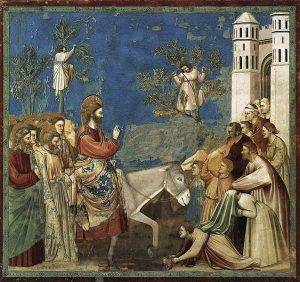“[Christ] having entered the battle, had nails affixed to his feet as shin guards, He held a reed in [his] hand for a lance, [his] hands were affixed with nails for a sword. He had the cross for a shield, for a breastplate [He had] flowing blood on [his] entire body, [He had] a scarlet cloak for a soldier’s tunic and crown of thorns for a helmet. Indeed, conversely, the devil had as a shield, infidelity, for a helmet, pride, for a lance, wicked suggestion, for a sword the power of ruler, for a breastplate, the mob of the disloyal. Thus, therefore, [Christ] not armed in his hand, but affixed with nails, defeated the armed strong one, and lead away his spoils, liberated his own from the prison, and thus ascending into heaven he lead captivity captive.” Alan of Lille, De ramis palmarum in Alain de Lille, Textes inédites. ed. Marie-Thérèse d’Alverny. Études de philosophe medievale 12 (Paris 1965), p. 248. [My translation] 
In this Palm Sunday sermon, Alan of Lille, a late twelfth-century preacher and theologian in medieval France, compared Christ to a warrior who defeated the devil and sin on the cross. He imagined that the devil had taken the castle of humanity through the temptation of Eve and Adam’s original sin and vice. Therefore, Christ came to the castle of the Virgin Mary, fortified by her virtues, and became a human being. Thereby, He could overcome the devil through His Passion as described above. Having won the battle for redemption, Christ ascended into heaven and left believers as castles of virtue to resist sin and the devil through chastity of mind and body. Alan exhorted his hearers in the following manner:
“Let us spread our clothing on the road, by punishing our bodies through abstinence, by preparing the way for Him, who is the Truth and the Life. Let us exclaim with mind, mouth, and action: ‘Hosanna in the highest’ so that Jesus Christ might deign to save us, not in low places of earthly places, but in the heights of the heavenly places, not in the greeting of the left, but of the right, so that the Blessed One who comes in the name of the Lord may deign to bless us, in the present by keeping us in grace, [and] in the future by crowning us in glory.” Ibid., p. 249.


